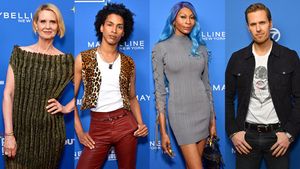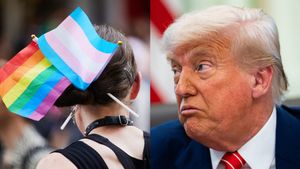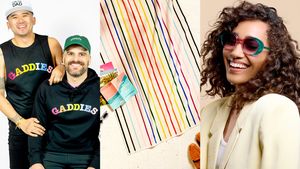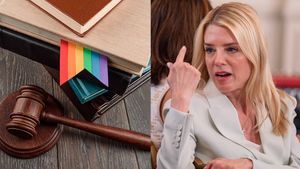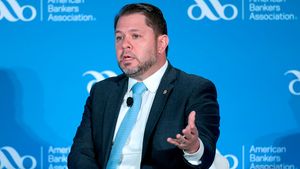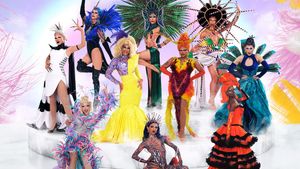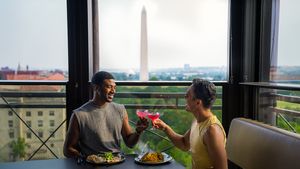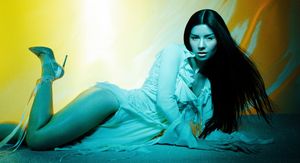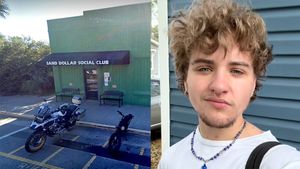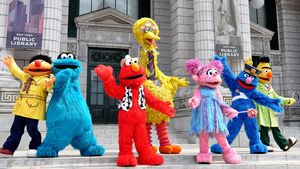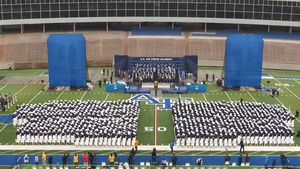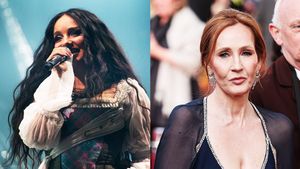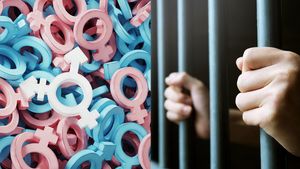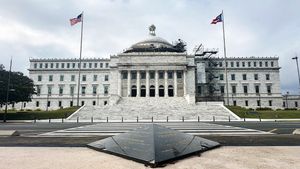Having voice in the Black Community is still an arduous struggle for its lesbian, gay, bisexual and transgender (LGBTQ) members. As we cross over into 2012, one of our biggest accomplishments in 2011 has been the various ways in which LGBTQ of African descent have employed different public venues to be heard. These following venues will be used as instruments of change in our future struggle.
The Stage
While most Harlem churches won’t touch LGBTQ issues, various gay-friendly arts venues in Harlem will.
On April 26, 2011 the Harlem Stage premiered the new documentary short film, Marriage Equality: Byron Rushing and the Fight for Fairness, allowing the largest public dialogue on same-sex marriage by LGBTQ people of color in the country. New York native and award-winning African American gay filmmaker Thomas Allen Harris directed the film, sponsored by the Human Rights Campaign.
Harris tackles the continued hot-button issue in both the African American and LGBTQ communities. Civil rights: black vs. gay. Harris dismantles the false dichotomy of this ongoing debate by connecting the Black Civil Rights Movement of 1960s with the same-sex marriage equality movement of today. And he does it by focusing on African American Democratic Massachusetts State Rep. Byron Rushing, a veteran of the Civil Rights Movement who, in the past decade, took the campaign for same-sex marriage into African-American communities here in Massachusetts.
With over 200 LGBTQ people of color and allies in attendance at the Harlem Stage, renown gay African American Washington Post editorial writer Jonathan Capehart moderated the forum on same-sex marriage with a panel that included entrepreneur and activist Russell Simmons; Cathy Marino-Thomas, board president of Marriage Equality New York; Human Rights Campaign board of directors member David Wilson; myself; and a host of rights advocates, political activists, and religious leaders.
Black Colleges
Historically Black Colleges and Universities (HBCU) as a whole have been slow to take on the public challenge on LGBTQ issues for a few reasons: Some schools were founded with religious affiliation, and Black colleges are no different from African American communities in general. But during "Coming Out Month," the Human Rights Campaign Foundation’s HBCU Program hit campuses again. In an effort to educate and organize students, faculty, and administrators in advocating for LGBTQ equality and social justice specific to each institution’s needs, HRC conducts annually the black LGBTQ Student Leadership Summit to help college age students to deal with strong family foundations that emphasize heterosexuality and strong conservative religious ties within the Black Church. "It takes a lot of courage to stand up on an HBCU campus and be proud of who you are," said HRC Associate Director of Diversity Donna Payne. "That is why we support training this generation to be effective leaders that will change the course of what it means to be African American and LGBT."
The Court
Bishop Eddie Long, one of the Black Church’s prominent pastors of "prosperity gospel" and bling-bling theology in the Southeast, is flashing neither his gold nor silver these days. The embattled pastor had hoped that settling a sex scandal lawsuit for an undisclosed amount against allegations that he used influence, trips, gifts, and jobs to coerce young males into sexual relations would close the lid on the matter. But the mess wouldn’t subside and trouble kept coming: he’s now stepped down temporarily from his bully pulpit.
Long has not created the homophobic climate in the Black Church, but he has certainly contributed to it. With a membership of over 25,000, Long’s church is the largest African American megachurch in the Southeast. And as the largest it can begin, with his sex scandal, to effect change by embracing a liberating, healthy, and holistic understanding of human sexuality. And in so doing, Long would be creating a model of pastoral care not only for heterosexuals or homosexuals, but most importantly, for himself.
more on next page...
\\\
(continued)
Memoir
CNN’s Don Lemon penned a memoir titled Transparentthat will come out in September. In writing his book, Lemon said "the decision to come out happened organically." In this era of acceptance of LGBTQ people in news broadcasting like Lemon’s (closeted) colleague Anderson Cooper, ABC’s "Good Morning America" weather anchor Sam Champion, MSNBC’s Rachel Maddow and her colleague Thomas Roberts, to name a few, one would wonder about the source of the media brouhaha with Lemon’s disclosure, especially since it was not secret at work about his sexual orientation.
"It’s quite different for an African-American male," Lemon told Joy Behar on her HLN show. "It’s about the worst thing you can be in black culture. You’re taught you have to be a man; you have to be masculine. In the black community they think you can pray the gay away."
And Lemon is right. With homophobia running as rampant in historically black colleges and universities as it is in black communities, there are no safe places for GBTQ brothers of African descent to safely acknowledge their sexuality or to openly engage the subject of black GBTQ sexualities.
Lemon resides in Atlanta. It’s the new black Mecca and the new "Black Hollywood" that it’s fondly called "Hot-lanta." And it’s also dubbed the "down low" capital. The Black LGBTQ community applauded Lemon for coming out.
Public Recant
Tim Hardaway, a retired NBA All-Star player, in 2011 stepped forward with a change of words.
"It’s not right to not let the gays and lesbians have equal rights here," Hardaway told the crowd at a press conference organized by the "No Recall" group, an El Paso group opposing a recall of El Paso Mayor John Cook and two city representatives for their support to re-establish domestic partner benefits for same-sex and unmarried partners of city employees.
Hardaway, however, is the last person one would expect to speak out on behalf of a LGBTQ social justice issue.
In a 2007 interview on Miami’s sports radio station, "790 The Ticket," Hardaway was asked how he would interact with a gay teammate. The topic came up because of fellow former NBAer John Amaechi’s announcement, in his book Man in the Middle, that he is gay.
"You know, I hate gay people, so I let it be known. I don’t like gay people and I don’t like to be around gay people," Hardaway said. "I’m homophobic. I don’t like it. It shouldn’t be in the world or in the United States."
A change of words helps bring a change of heart.
Film
Positive portrayals of black LGBTQs on the silver screen are an anomaly.
This paucity of black LGBTQ images not only maintains the lie that we don’t exist, but it has also allowed the African American community to retreat into a closet producing black homophobic flicks.
But the tide is turning.
A new film is soon to come out by writer-director Dee Rees titled Pariah, a semi-autobiographical drama, which generated a lot of buzz at the 2011 Sundance Film Festival. It’s both a coming-of-age and coming-out film about a 17-year-old black lesbian in Brooklyn falling in love and embracing one’s identity.
Follow SheWired on Twitter!
Follow SheWired on Facebook!












































